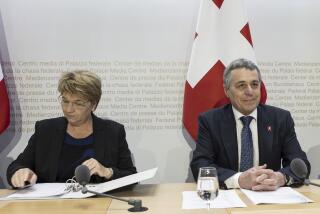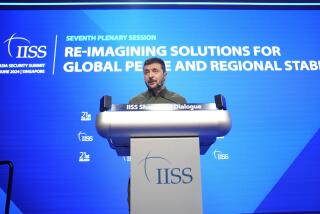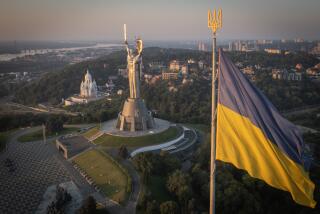Palestinian Urges Mideast Talks Boycott : Peace process: Shunning the Moscow conference this month could torpedo American hopes for regional arms control and economic cooperation.
- Share via
WASHINGTON — The chief of the Palestinian delegation to the Middle East peace talks said Friday that he will recommend a Palestinian boycott of the regional conference scheduled for Moscow later this month, a step that could torpedo American hopes for Middle East arms control and economic cooperation.
“Personally, I don’t see how we can participate in the multilateral talks without progress on the political level,” said Haidar Abdel-Shafi.
He said the regional meeting is pointless in the face of the deadlocked bilateral peace talks between Israel and each of its closest neighbors, Syria, Lebanon, Jordan and the Palestinians.
If the Palestinians follow Abdel-Shafi’s advice, it could start a chain reaction of Arab withdrawals from the conference scheduled for Jan. 28 and 29.
The Moscow meeting is intended to be the third phase of the U.S.- and Russian-sponsored peace process.
It is supposed to follow the opening conference in Madrid held last October and the bilateral negotiations in Washington, which recessed Thursday until sometime in February.
Syria said last summer that it will not attend the Moscow meeting.
But the United States and Russia sent invitations to Israel, Jordan, Lebanon, the Palestinians, Saudi Arabia and other oil-rich Gulf Arab states, the European Community, Japan and several other participants.
The purpose of the conference is to discuss regional issues such as arms control, water resources and economic development.
Washington hopes the Saudis, Japanese and Europeans will agree to help finance cooperative projects that would give Israel and its Arab adversaries a shared stake in peace.
But if the Palestinians pull out, other Arabs could be expected to follow them.
There have been doubts about Lebanon’s participation all along because the Beirut government usually follows Syria’s lead. Lebanon may participate, if all of the other Arabs do.
But if any delegation joins Syria on the sidelines, Lebanon will almost surely follow suit.
That would leave Jordan--which has said repeatedly that it wants to attend--as the only Arab neighbor of Israel at the table. The Hashemite kingdom is unlikely to buck that sort of trend.
Without participation of the Arab front-line states, it is doubtful that Saudi Arabia or any other Arab government would attend.
The legacy is frightful to overcome. “We know that Jordan is interested in going to this multilateral conference, but if the Palestinians do not go and the Syrians and the Lebanese do not go, I don’t know that there will be much for the multilaterals to do,” Abdel-Shafi said.
U.S. officials, insisting that the Palestinians have made no final decision, met frequently with Palestinian representatives this week in an effort to persuade them to go to Moscow.
Hanan Ashrawi, the Palestinian spokeswoman, said the decision on Palestinian participation ultimately would be made by the Palestine Liberation Organization.
Recapping this week’s Israeli-Palestinian talks, Abdel-Shafi said his delegation considers an end to Jewish settlements in the occupied West Bank and Gaza Strip to be a “prerequisite” for progress in negotiations.
But he insisted that the Palestinians are not thinking about pulling out of the face-to-face talks, at least not yet.
Unlike Egypt, which insisted on the removal of Jewish settlements from the Sinai before that territory was returned to Egyptian sovereignty, Abdel-Shafi said the Palestinian state that he hopes to establish might let the settlers remain.
“If the settlers want to stay as citizens in the Arab state, that’s OK, but we have to have something in exchange for that,” Abdel-Shafi said. He did not elaborate.
More to Read
Sign up for Essential California
The most important California stories and recommendations in your inbox every morning.
You may occasionally receive promotional content from the Los Angeles Times.










